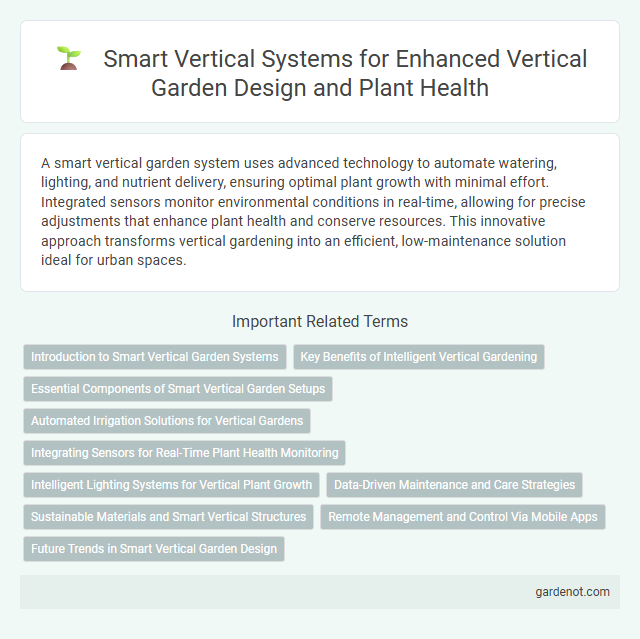A smart vertical garden system uses advanced technology to automate watering, lighting, and nutrient delivery, ensuring optimal plant growth with minimal effort. Integrated sensors monitor environmental conditions in real-time, allowing for precise adjustments that enhance plant health and conserve resources. This innovative approach transforms vertical gardening into an efficient, low-maintenance solution ideal for urban spaces.
Introduction to Smart Vertical Garden Systems
Smart vertical garden systems integrate automated irrigation, climate control, and sensor technology to optimize plant health and growth in limited spaces. These systems use IoT-enabled devices to monitor soil moisture, light levels, and temperature, adjusting conditions in real-time for efficient water and nutrient usage. By combining sustainability with advanced technology, smart vertical gardens enhance urban greening and improve air quality while minimizing maintenance efforts.
Key Benefits of Intelligent Vertical Gardening
Intelligent vertical gardening systems optimize water usage through automated irrigation and sensors, reducing waste by up to 40%. These smart setups enhance plant health by monitoring light, humidity, and temperature, ensuring ideal growth conditions year-round. Integration with mobile apps allows real-time control and maintenance alerts, maximizing efficiency and convenience for urban gardeners.
Essential Components of Smart Vertical Garden Setups
Smart vertical garden setups integrate essential components such as automated irrigation systems that precisely control water delivery, LED grow lights optimized for plant photosynthesis, and IoT sensors to monitor soil moisture, temperature, and nutrient levels. These components enable efficient resource management and promote healthy plant growth by maintaining optimal environmental conditions. Integration with mobile apps allows real-time data tracking and remote system adjustments for enhanced garden care.
Automated Irrigation Solutions for Vertical Gardens
Smart vertical garden systems incorporate automated irrigation solutions that precisely regulate water delivery based on plant species, moisture levels, and environmental conditions. These systems utilize sensors and IoT technology to optimize water usage, reduce waste, and enhance plant health in vertical gardening setups. Integration of automated irrigation ensures consistent hydration, improves growth rates, and minimizes maintenance efforts in vertical garden installations.
Integrating Sensors for Real-Time Plant Health Monitoring
Smart vertical garden systems integrate advanced sensors to monitor plant health in real-time, measuring parameters such as soil moisture, temperature, and light intensity. These sensors provide continuous data that enable precise irrigation and nutrient management, reducing resource waste and promoting optimal plant growth. Real-time monitoring through IoT connectivity ensures early detection of diseases and environmental stress, enhancing the overall efficiency and sustainability of vertical gardens.
Intelligent Lighting Systems for Vertical Plant Growth
Intelligent lighting systems for vertical plant growth utilize advanced LED technology to optimize light spectrum and intensity, enhancing photosynthesis and promoting healthier, faster plant development. These smart lighting solutions adapt in real-time based on plant species, growth stage, and environmental conditions, ensuring efficient energy use and minimizing waste. Integration with IoT sensors enables precise control over light duration and distribution, maximizing yield in limited vertical spaces.
Data-Driven Maintenance and Care Strategies
Smart vertical garden systems leverage IoT sensors to continuously monitor environmental factors such as humidity, temperature, and soil moisture, enabling precise data-driven maintenance and care strategies. Machine learning algorithms analyze sensor data to optimize irrigation schedules, nutrient delivery, and pest management, enhancing plant health and resource efficiency. Integrating real-time data with automated controls reduces water waste by up to 40% and increases plant growth rates by 25% compared to traditional vertical garden setups.
Sustainable Materials and Smart Vertical Structures
Smart vertical garden systems integrate sustainable materials such as recycled plastics and bamboo composites, enhancing environmental friendliness and durability. These smart vertical structures utilize automated irrigation and sensor-based monitoring to optimize water usage and plant health. Combining eco-friendly materials with technology-driven maintenance significantly reduces ecological impact while maximizing green space efficiency.
Remote Management and Control Via Mobile Apps
Smart vertical garden systems enable precise remote management and control through dedicated mobile apps, allowing users to monitor plant health, adjust irrigation, and regulate lighting from anywhere. These apps integrate IoT sensors that track soil moisture, temperature, and humidity, optimizing conditions for plant growth. Remote access reduces maintenance efforts and enhances sustainability by enabling timely interventions based on real-time data.
Future Trends in Smart Vertical Garden Design
Smart vertical garden systems integrate IoT sensors and automated irrigation to optimize plant health and resource efficiency, reducing water waste by up to 40%. Future trends emphasize AI-driven climate control and nutrient monitoring, enabling adaptive growth environments for diverse plant species. Modular designs combined with renewable energy sources like solar panels will enhance sustainability and scalability in urban green spaces.
Smart vertical system Infographic

 gardenot.com
gardenot.com